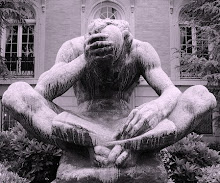 The recent earthquake in L'Aquila, Italy destroyed not only quite a few lives but also an extensive amount of medieval architecture that had survived a 18th-century quake. Certainly the loss of medieval material history is unfortunate, but certainly not as bad as the loss of life. The thing is, taking a really "long view"of time and the Earth means not really lamenting it at all. In a lithic view of time, these churches, towers, walls are houses of cards--erected for a moment and built so tenuously that they fall down after a mere shudder.
The recent earthquake in L'Aquila, Italy destroyed not only quite a few lives but also an extensive amount of medieval architecture that had survived a 18th-century quake. Certainly the loss of medieval material history is unfortunate, but certainly not as bad as the loss of life. The thing is, taking a really "long view"of time and the Earth means not really lamenting it at all. In a lithic view of time, these churches, towers, walls are houses of cards--erected for a moment and built so tenuously that they fall down after a mere shudder.Perhaps this view is completely off; perhaps it's a we-all-return-from-whence-we-came sort of view whose big selling point is that it's comforting and totally unprovable. I don't know. I do know that in general, removed terms, I actually mourn the loss of those historical artifacts more than the loss of human life.
 But only in general, removed terms. Give me the choice between torching a Gutenberg Bible and saving the life of one of my students and I'll flick my Bic. Not that I'd feel good about it or that it wouldn't haunt me for years afterward, but I'd do it without hesitation. But when it's faceless Italians who are represented by just an unfathomable number (not many of us can really envision 200+ corpses or 1000 people who've been injured; that takes experience in wartime or Katrina to understand, I think), it's easier to mourn for the loss of history. I think in some ways--especially for classicists and medievalists--the loss of history hurts more because our minds soar. What did we lose when the Great Library in Alexandria burned? What did we lose in the Ashburnham fire of 1731. But sometimes the loss is greater when a person dies. What did we lose when Hemingway put a gun in his mouth? What did we lose when Tolkien, Borges, or Barthes died? Was there more they had to say? For that matter, what do we lose every time some kid in Africa dies because he can't get enough to eat or drink? Do we lose a voice like Achebe? What do we lose every time some sorry bastard dominates and silences (in one way or another) the voice of his wife because she's a woman? Do we lose a Gilman?
But only in general, removed terms. Give me the choice between torching a Gutenberg Bible and saving the life of one of my students and I'll flick my Bic. Not that I'd feel good about it or that it wouldn't haunt me for years afterward, but I'd do it without hesitation. But when it's faceless Italians who are represented by just an unfathomable number (not many of us can really envision 200+ corpses or 1000 people who've been injured; that takes experience in wartime or Katrina to understand, I think), it's easier to mourn for the loss of history. I think in some ways--especially for classicists and medievalists--the loss of history hurts more because our minds soar. What did we lose when the Great Library in Alexandria burned? What did we lose in the Ashburnham fire of 1731. But sometimes the loss is greater when a person dies. What did we lose when Hemingway put a gun in his mouth? What did we lose when Tolkien, Borges, or Barthes died? Was there more they had to say? For that matter, what do we lose every time some kid in Africa dies because he can't get enough to eat or drink? Do we lose a voice like Achebe? What do we lose every time some sorry bastard dominates and silences (in one way or another) the voice of his wife because she's a woman? Do we lose a Gilman?At any rate, this event makes me think about what people will say in 100 years. I imagine it will be something along the lines of what we say now. We complain about Early Moderns tearing up medieval MSS to make end pages for their books or reinforce spines. We complain about what the medieval inhabitants did to the Roman baths in Bath. We complain about what contemporary acid rain has done to Cleopatra's Needle and what the shipwreck did to the Elgin Marbles. I bet one day, they'll complain about the crude and damaging methods used to rescue the victims in L'Aquila. What they will forget--and what we forget now--are the pressing concerns, the (sometimes fierce) urgency of Now that dictates our actions.
I guess the moral of the story is that sometimes the Earth throws off our intricate structures and screws up our history. And sometimes we do.

No comments:
Post a Comment